Unit 5 Why do you like pandas?单元重要知识点讲义课件(共38张PPT)
文档属性
| 名称 | Unit 5 Why do you like pandas?单元重要知识点讲义课件(共38张PPT) | 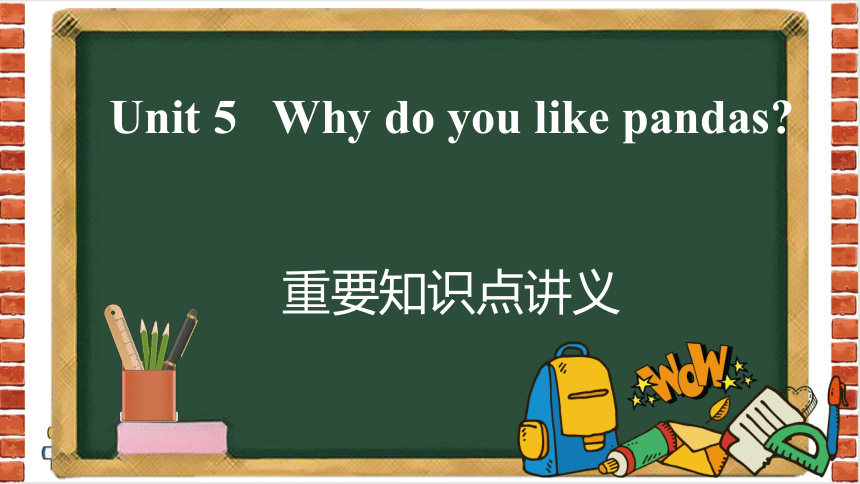 | |
| 格式 | pptx | ||
| 文件大小 | 1.6MB | ||
| 资源类型 | 教案 | ||
| 版本资源 | 人教新目标(Go for it)版 | ||
| 科目 | 英语 | ||
| 更新时间 | 2023-04-02 19:17:02 | ||
图片预览


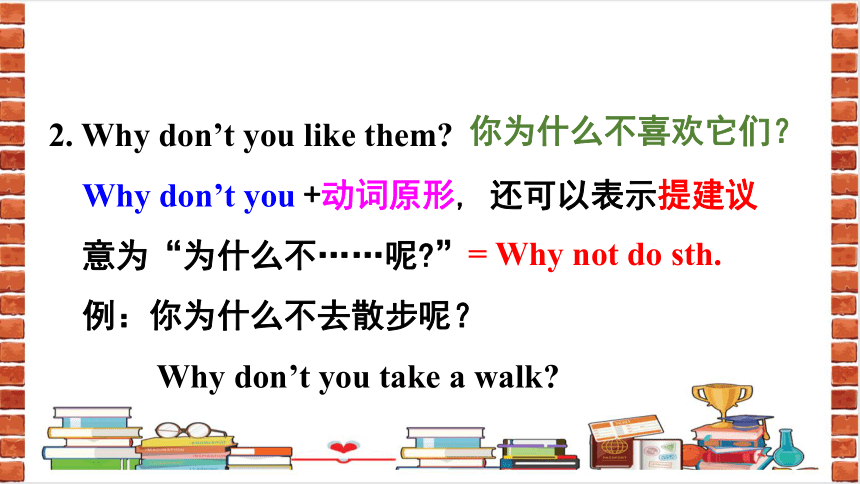
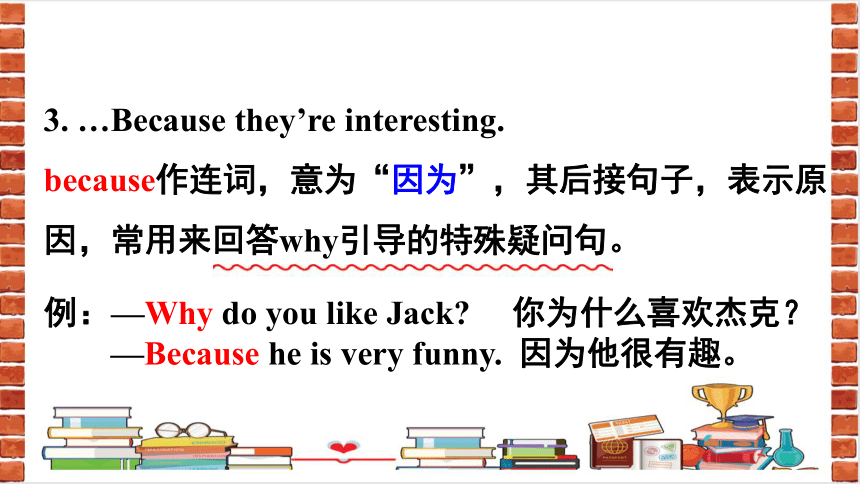
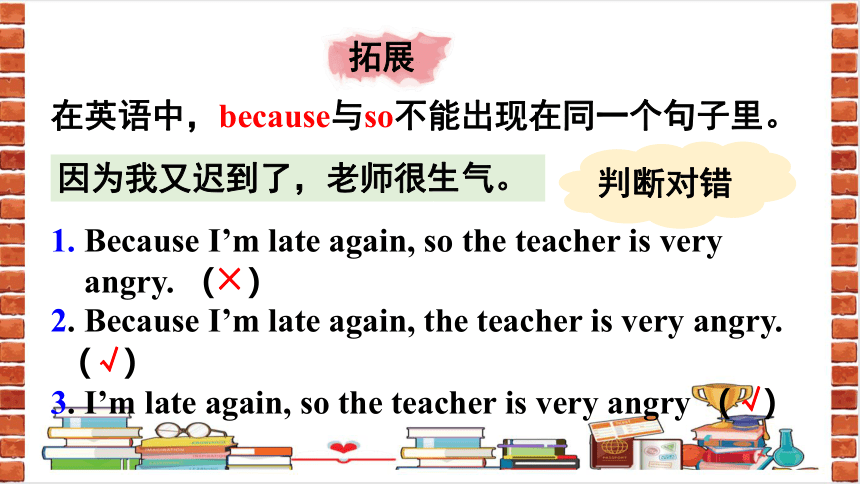
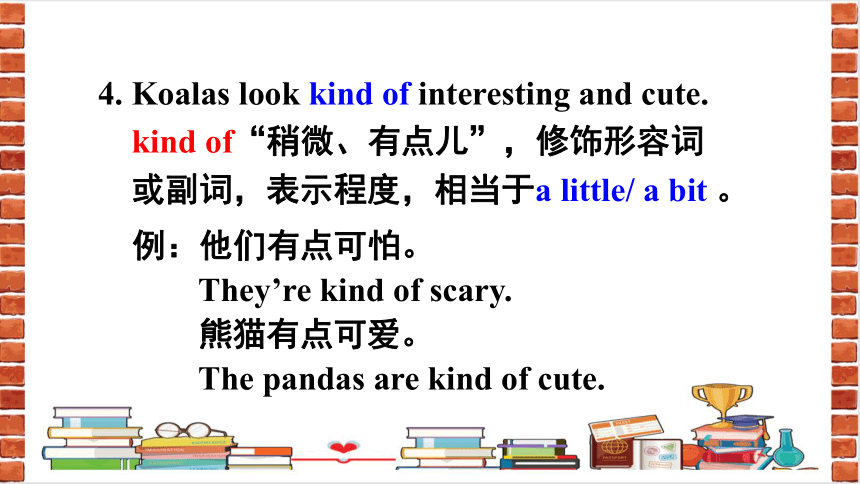
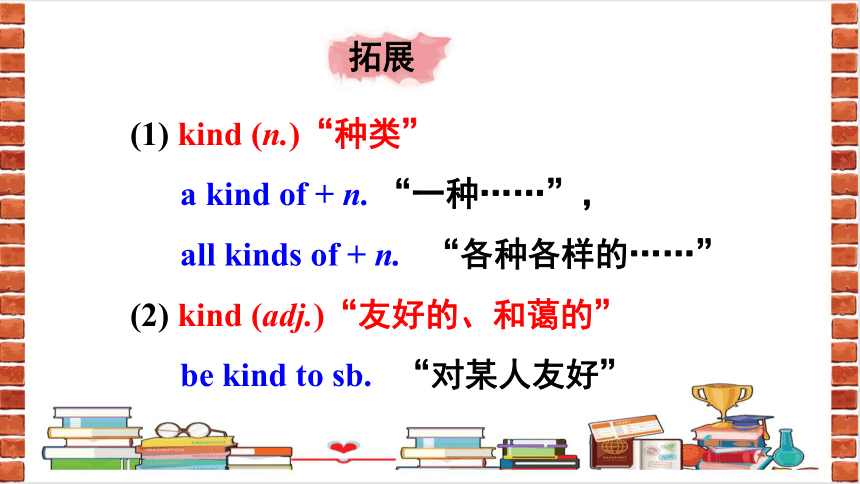
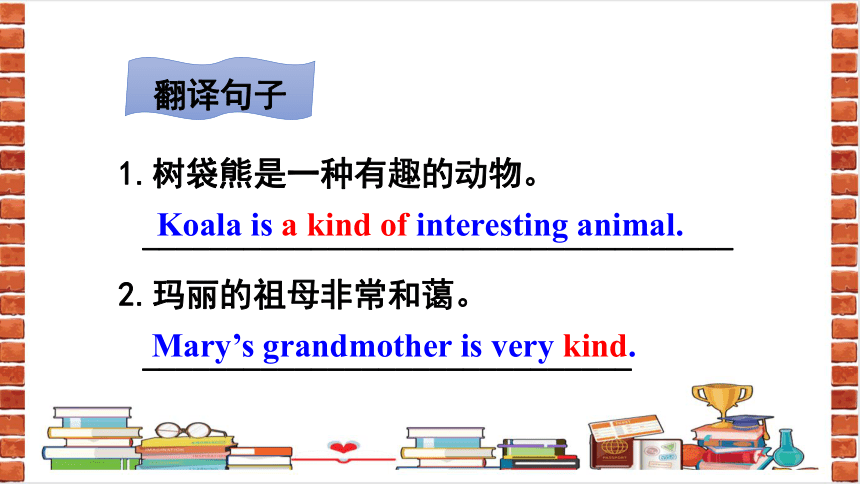
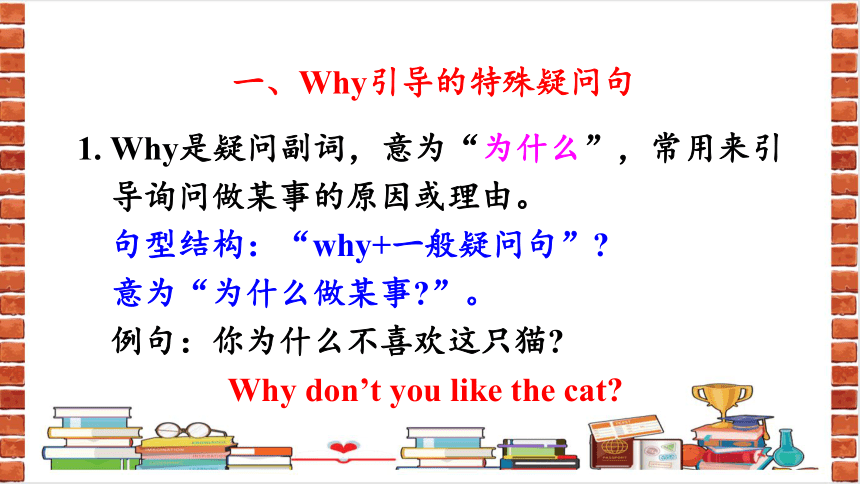
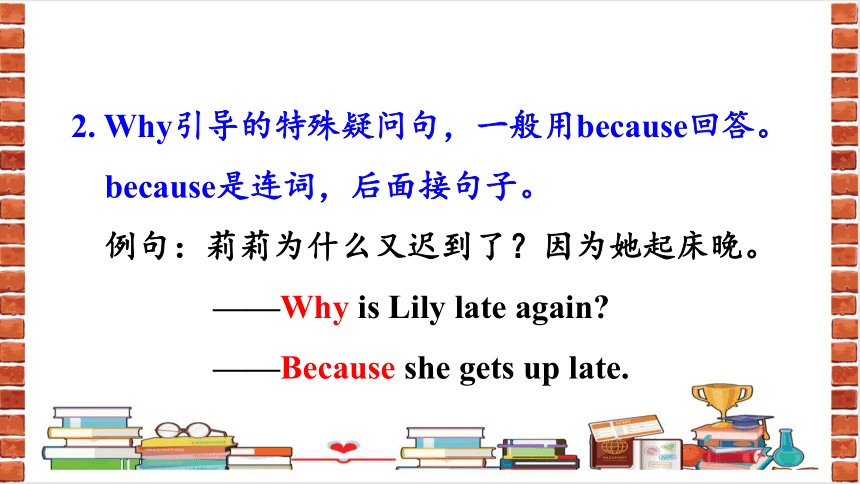

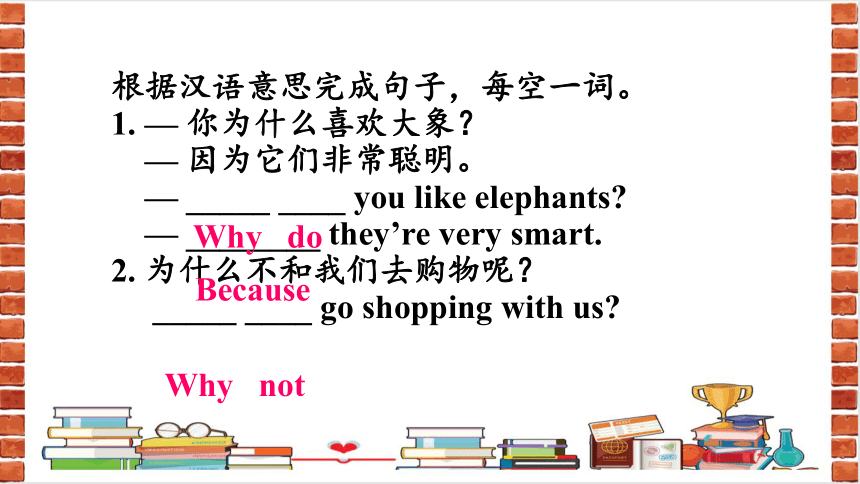
文档简介
(共38张PPT)
Unit 5 Why do you like pandas
重要知识点讲义
1. Let’s see the lions.
let’s do sth. 祈使句,“让我们做某事吧”,
用提出建议 (let’s =let us)
其否定形式是在动词原形前加not。
let sb. do sth. “让某人做某事”
例:咱们先做作业吧。
_________________________
Let’s do our homework first.
Language points
2. Why don’t you like them
Why don’t you +动词原形, 还可以表示提建议
意为“为什么不……呢 ”
例:你为什么不去散步呢?
Why don’t you take a walk
= Why not do sth.
你为什么不喜欢它们?
3. …Because they’re interesting.
because作连词,意为“因为”,其后接句子,表示原因,常用来回答why引导的特殊疑问句。
例:—Why do you like Jack 你为什么喜欢杰克?
—Because he is very funny. 因为他很有趣。
在英语中,because与so不能出现在同一个句子里。
拓展
因为我又迟到了,老师很生气。
判断对错
1. Because I’m late again, so the teacher is very
angry. ( )
2. Because I’m late again, the teacher is very angry.
( )
3. I’m late again, so the teacher is very angry ( )
×
√
√
例:他们有点可怕。
They’re kind of scary.
熊猫有点可爱。
The pandas are kind of cute.
4. Koalas look kind of interesting and cute.
kind of“稍微、有点儿”,修饰形容词
或副词,表示程度,相当于a little/ a bit 。
(1) kind (n.)“种类”
a kind of + n. “一种……”,
all kinds of + n. “各种各样的……”
(2) kind (adj.)“友好的、和蔼的”
be kind to sb. “对某人友好”
拓展
树袋熊是一种有趣的动物。 ___________________________________
2.玛丽的祖母非常和蔼。 _____________________________
Koala is a kind of interesting animal.
Mary’s grandmother is very kind.
翻译句子
一、Why引导的特殊疑问句
1. Why是疑问副词,意为“为什么”,常用来引
导询问做某事的原因或理由。
句型结构:“why+一般疑问句”
意为“为什么做某事 ”。
例句:你为什么不喜欢这只猫
Why don’t you like the cat
2. Why引导的特殊疑问句,一般用because回答。
because是连词,后面接句子。
例句:莉莉为什么又迟到了?因为她起床晚。
——Why is Lily late again
——Because she gets up late.
3. why可用于提出建议
Why don’t you + 动词原形 + 其他?
Why not + 动词原形 + 其他?
意为“你为什么不做……呢?”
答语:That’s a good idea. / Good idea.
That sounds good.
根据汉语意思完成句子,每空一词。
1. — 你为什么喜欢大象?
— 因为它们非常聪明。
— _____ ____ you like elephants
— ________ they’re very smart.
2. 为什么不和我们去购物呢?
_____ ____ go shopping with us
Why do
Because
Why not
1. where疑问副词,用于询问地点,意为“哪里;
什么地方”
回答:用be from回答,意为“来自于……”
例:他来自哪里?他来自澳大利亚。
— Where is he from
— He is from Australia.
二、Where is ... from
询问“来自于哪里”的其它方式
Where do/does +主语+ come from
答语:主语+ come(s) from ...
be from = come from
根据汉语意思完成句子,每空一词。
1. — 你来自哪里?
— 我来自澳大利亚。
— ______ _____ you _____
— _________ Australia.
2. 约翰来自于非洲。
John ______ ______________ Africa.
Where are from
I’m from
comes from / is from
三、形容词的基本用法
形容词通常用来描述和修饰名词或代词,说明人或事物的性质、状态和特征。大多数形容词既可作定语又可作表语。
1. 作定语
用于修饰名词,表示名词的属性,常置于
它所修饰的名词前。
例句:他是一个帅气的男孩。
He is a handsome boy.
2. 作表语
形容词可以置于be, seem, look, become, get, feel,
turn, grow等连系动词后面作表语.
例句:这些花儿很漂亮.
The flowers are beautiful.
3. 作宾语补足语
形容词可放在宾语之后作宾语补足语.
例句: 这部有趣的电影使我很开心.
The funny movie makes me happy.
Language points
4. friendly的用法
friendly 形容词 ,“友好的,和蔼可亲的”。
(1) friendly是“n.+ly”构成的形容词,
类似形容词: lovely(可爱的), likely(可能的),
lonely(孤独的)等。
例:It is likely that he is ill.
很有可能他病了。
(2) friendly固定搭配: “be friendly to sb 对某人友好”.
例:He is friendly to me. 他对我很友好。
a friendly game 一场友谊赛
(3) 反义词:unfriendly不友好的
5. shy的用法
shy 形容词 ,“羞怯的;腼腆的”。
例:她在大人面前很拘束。
She is very shy with adults.
拓展
shyly(adv.)
shyness(n.)
6. …and we want to save the elephants.
save(v.) 意为“救;救助” 后接名词或代词作宾语。
save one’s life 挽救某人的生命
save sb./sth. from (doing) sth.
将某人/某物从(做)某事中救出来
save的其他用法
He saves money to buy a car.
Please save water.
I save the photo in the computer.
拓展
save
储蓄;攒钱
节省;节约
保存
The high-speed train will _____ you about two hours from Rizhao to Jinan.
A. save B. pay C. used spend
(山东日照中考)
7. The elephant is one of Thailand’s symbols.
symbol (n.) 意为“象征”,
a symbol of … ,意为“……的象征”
例:长城是中国的标志之一。
The Great Wall is one of
the symbols of China.
8. People say that “an elephant never forgets”.
forget作动词, 意为“忘记”,
forget+名词/代词 ,意为“忘记某物/某人”
例:很抱歉, 我忘记了你的名字。
I am sorry but I forget your name.
forget的不同搭配
词 条 用法及例句
forget to do sth.
forget doing sth.
忘记去做某事(未做)
忘记做过某事(做过但是忘了)
拓展
活学活用
①别忘了关窗户。
Don’t forget the door.
②汤姆忘记已经把教室的灯关了。
Tom forgot the lights in the classroom.
to close
turning off
9. Elephants can walk for a long time and never get lost.
lost(adj.) 意为“迷路的;丢失的”
get/be lost 意为“迷路;丢失”
lose one’s way=get/be lost 意为“迷路”
例:那老太太在去公园的路上迷路了。
The old woman got lost on her way to the park.
10. …remember places with food and water.
place(n.) 意为“地点;位置”,
a place of interest 意为“名胜”
例:我们游览了很多名胜古迹。
We visited a lot of places of interest.
11. But elephants are in great danger.
danger(n.)“危险”, 常与介词in连用
in great danger 处于极大危险之中
out of danger 脱离危险
例:现在很多物种都处于危险之中。
Many species are now in danger.
12. People cut down many trees …
cut down 意为“砍倒”,属于“动词+副词”短语。
其后的宾语是名词时,可放在该短语中间, 也可放到后面;后接代词时,只能放中间。
例:让我们砍了这棵枯了的树吧。
Let’s cut down the dead tree.
13. We must save the trees and not buy things
made of ivory.
(1)made of ivory “由象牙制成”, 为过去分词短
语作后置定语, 修饰前面的名词things。
(2)be made of “由……制成”, 可以看出原材料。
(1)成品+be made
of +材料(可以看出原材料)
from+材料(看不出原材料)
拓展
be made of, be made from与be made into
(2)材料+be made into +成品。
活学活用
①毛衣常由羊毛制成。
Sweaters are often wool.
②尼龙是由空气、煤和水加工制成的。
Nylon is air, coal and water.
③这些橙皮可以加工成药材出售。
These orange peels can medicine
for sale.
made of
made from
be made into
Thanks for your attention!
Unit 5 Why do you like pandas
重要知识点讲义
1. Let’s see the lions.
let’s do sth. 祈使句,“让我们做某事吧”,
用提出建议 (let’s =let us)
其否定形式是在动词原形前加not。
let sb. do sth. “让某人做某事”
例:咱们先做作业吧。
_________________________
Let’s do our homework first.
Language points
2. Why don’t you like them
Why don’t you +动词原形, 还可以表示提建议
意为“为什么不……呢 ”
例:你为什么不去散步呢?
Why don’t you take a walk
= Why not do sth.
你为什么不喜欢它们?
3. …Because they’re interesting.
because作连词,意为“因为”,其后接句子,表示原因,常用来回答why引导的特殊疑问句。
例:—Why do you like Jack 你为什么喜欢杰克?
—Because he is very funny. 因为他很有趣。
在英语中,because与so不能出现在同一个句子里。
拓展
因为我又迟到了,老师很生气。
判断对错
1. Because I’m late again, so the teacher is very
angry. ( )
2. Because I’m late again, the teacher is very angry.
( )
3. I’m late again, so the teacher is very angry ( )
×
√
√
例:他们有点可怕。
They’re kind of scary.
熊猫有点可爱。
The pandas are kind of cute.
4. Koalas look kind of interesting and cute.
kind of“稍微、有点儿”,修饰形容词
或副词,表示程度,相当于a little/ a bit 。
(1) kind (n.)“种类”
a kind of + n. “一种……”,
all kinds of + n. “各种各样的……”
(2) kind (adj.)“友好的、和蔼的”
be kind to sb. “对某人友好”
拓展
树袋熊是一种有趣的动物。 ___________________________________
2.玛丽的祖母非常和蔼。 _____________________________
Koala is a kind of interesting animal.
Mary’s grandmother is very kind.
翻译句子
一、Why引导的特殊疑问句
1. Why是疑问副词,意为“为什么”,常用来引
导询问做某事的原因或理由。
句型结构:“why+一般疑问句”
意为“为什么做某事 ”。
例句:你为什么不喜欢这只猫
Why don’t you like the cat
2. Why引导的特殊疑问句,一般用because回答。
because是连词,后面接句子。
例句:莉莉为什么又迟到了?因为她起床晚。
——Why is Lily late again
——Because she gets up late.
3. why可用于提出建议
Why don’t you + 动词原形 + 其他?
Why not + 动词原形 + 其他?
意为“你为什么不做……呢?”
答语:That’s a good idea. / Good idea.
That sounds good.
根据汉语意思完成句子,每空一词。
1. — 你为什么喜欢大象?
— 因为它们非常聪明。
— _____ ____ you like elephants
— ________ they’re very smart.
2. 为什么不和我们去购物呢?
_____ ____ go shopping with us
Why do
Because
Why not
1. where疑问副词,用于询问地点,意为“哪里;
什么地方”
回答:用be from回答,意为“来自于……”
例:他来自哪里?他来自澳大利亚。
— Where is he from
— He is from Australia.
二、Where is ... from
询问“来自于哪里”的其它方式
Where do/does +主语+ come from
答语:主语+ come(s) from ...
be from = come from
根据汉语意思完成句子,每空一词。
1. — 你来自哪里?
— 我来自澳大利亚。
— ______ _____ you _____
— _________ Australia.
2. 约翰来自于非洲。
John ______ ______________ Africa.
Where are from
I’m from
comes from / is from
三、形容词的基本用法
形容词通常用来描述和修饰名词或代词,说明人或事物的性质、状态和特征。大多数形容词既可作定语又可作表语。
1. 作定语
用于修饰名词,表示名词的属性,常置于
它所修饰的名词前。
例句:他是一个帅气的男孩。
He is a handsome boy.
2. 作表语
形容词可以置于be, seem, look, become, get, feel,
turn, grow等连系动词后面作表语.
例句:这些花儿很漂亮.
The flowers are beautiful.
3. 作宾语补足语
形容词可放在宾语之后作宾语补足语.
例句: 这部有趣的电影使我很开心.
The funny movie makes me happy.
Language points
4. friendly的用法
friendly 形容词 ,“友好的,和蔼可亲的”。
(1) friendly是“n.+ly”构成的形容词,
类似形容词: lovely(可爱的), likely(可能的),
lonely(孤独的)等。
例:It is likely that he is ill.
很有可能他病了。
(2) friendly固定搭配: “be friendly to sb 对某人友好”.
例:He is friendly to me. 他对我很友好。
a friendly game 一场友谊赛
(3) 反义词:unfriendly不友好的
5. shy的用法
shy 形容词 ,“羞怯的;腼腆的”。
例:她在大人面前很拘束。
She is very shy with adults.
拓展
shyly(adv.)
shyness(n.)
6. …and we want to save the elephants.
save(v.) 意为“救;救助” 后接名词或代词作宾语。
save one’s life 挽救某人的生命
save sb./sth. from (doing) sth.
将某人/某物从(做)某事中救出来
save的其他用法
He saves money to buy a car.
Please save water.
I save the photo in the computer.
拓展
save
储蓄;攒钱
节省;节约
保存
The high-speed train will _____ you about two hours from Rizhao to Jinan.
A. save B. pay C. used spend
(山东日照中考)
7. The elephant is one of Thailand’s symbols.
symbol (n.) 意为“象征”,
a symbol of … ,意为“……的象征”
例:长城是中国的标志之一。
The Great Wall is one of
the symbols of China.
8. People say that “an elephant never forgets”.
forget作动词, 意为“忘记”,
forget+名词/代词 ,意为“忘记某物/某人”
例:很抱歉, 我忘记了你的名字。
I am sorry but I forget your name.
forget的不同搭配
词 条 用法及例句
forget to do sth.
forget doing sth.
忘记去做某事(未做)
忘记做过某事(做过但是忘了)
拓展
活学活用
①别忘了关窗户。
Don’t forget the door.
②汤姆忘记已经把教室的灯关了。
Tom forgot the lights in the classroom.
to close
turning off
9. Elephants can walk for a long time and never get lost.
lost(adj.) 意为“迷路的;丢失的”
get/be lost 意为“迷路;丢失”
lose one’s way=get/be lost 意为“迷路”
例:那老太太在去公园的路上迷路了。
The old woman got lost on her way to the park.
10. …remember places with food and water.
place(n.) 意为“地点;位置”,
a place of interest 意为“名胜”
例:我们游览了很多名胜古迹。
We visited a lot of places of interest.
11. But elephants are in great danger.
danger(n.)“危险”, 常与介词in连用
in great danger 处于极大危险之中
out of danger 脱离危险
例:现在很多物种都处于危险之中。
Many species are now in danger.
12. People cut down many trees …
cut down 意为“砍倒”,属于“动词+副词”短语。
其后的宾语是名词时,可放在该短语中间, 也可放到后面;后接代词时,只能放中间。
例:让我们砍了这棵枯了的树吧。
Let’s cut down the dead tree.
13. We must save the trees and not buy things
made of ivory.
(1)made of ivory “由象牙制成”, 为过去分词短
语作后置定语, 修饰前面的名词things。
(2)be made of “由……制成”, 可以看出原材料。
(1)成品+be made
of +材料(可以看出原材料)
from+材料(看不出原材料)
拓展
be made of, be made from与be made into
(2)材料+be made into +成品。
活学活用
①毛衣常由羊毛制成。
Sweaters are often wool.
②尼龙是由空气、煤和水加工制成的。
Nylon is air, coal and water.
③这些橙皮可以加工成药材出售。
These orange peels can medicine
for sale.
made of
made from
be made into
Thanks for your attention!
同课章节目录
- Unit 1 Can you play the guitar?
- Section A
- Section B
- Unit 2 What time do you go to school?
- Section A
- Section B
- Unit 3 How do you get to school?
- Section A
- Section B
- Unit 4 Don't eat in class.
- Section A
- Section B
- Unit 5 Why do you like pandas?
- Section A
- Section B
- Unit 6 I'm watching TV.
- Section A
- Section B
- Review of Units 1-6
- Unit 7 It's raining!
- Section A
- Section B
- Unit 8 Is there a post office near here?
- Section A
- Section B
- Unit 9 What does he look like?
- Section A
- Section B
- Unit 10 I'd like some noodles.
- Section A
- Section B
- Unit 11 How was your school trip?
- Section A
- Section B
- Unit 12 What did you do last weekend?
- Section A
- Section B
